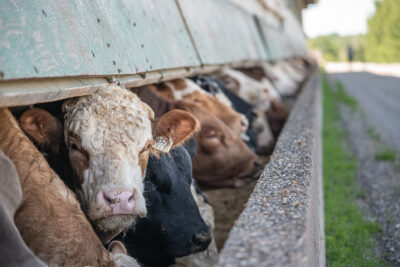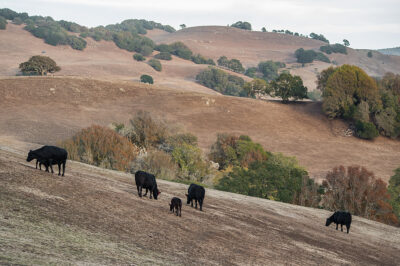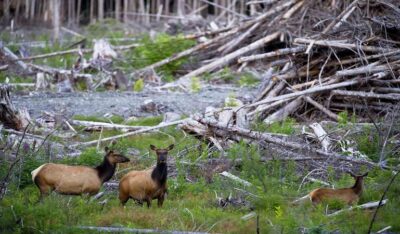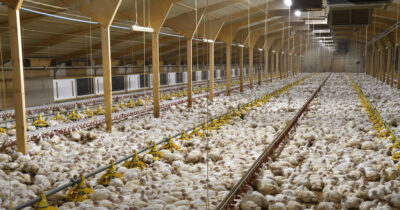Of all mammals on Earth, a massive 60 per cent are farmed animals, while a tiny four per cent are wild animals. These figures indicate the huge impact that meat production has on the world. Farming billions of animals every year to satisfy the global demand for meat has serious consequences for everything from the climate and the soil to public health and human rights.
HOW DOES MEAT PRODUCTION AFFECT THE ENVIRONMENT?
1. MEAT PRODUCTION CAUSES DEFORESTATION AND FOREST FIRES
All over the world, land has been converted on a massive scale to grazing pasture for animals or to create croplands to grow animal feed. The destruction of ecosystems is particularly acute in areas such as the Amazon, where an area of rainforest the size of a football pitch is being cleared every single minute, and Queensland in Australia, where an area of forest the size of Sydney was cut down in 2015-16, killing an estimated 45 million wild animals in the process.
Forests degraded and fragmented by deforestation are more prone to wildfires. Tropical rainforests like the Amazon are naturally moist and not typically likely to experience serious wildfire events. But as large swathes of them are cut down, they become drier, and when people deliberately set fires in order to clear more forest for animal agriculture, these fires can more easily spread out of control.
2. MEAT PRODUCTION CAUSES CLIMATE CHANGE
According to a major study published in Nature Food, agriculture is responsible for 35 per cent of global greenhouse gas emissions, with 57 per cent of that being attributable to farming animals and growing crops to feed them. Methane emitted by cows is a particular problem, as its short-term warming potential is much greater than that of carbon dioxide. Clearing ecosystems for grazing land and to grow feed crops, as well as emissions from the vast amounts of manure generated by farmed animals all contribute to the climate impacts of meat production.
3. MEAT PRODUCTION IS PUSHING THE AMAZON RAINFOREST CLOSER TO A TIPPING POINT
“Cattle” ranching (farming cows) and growing soya for animal feed are the leading causes of Amazon deforestation. So much of the Amazon has been deforested that it is close to a tipping point, at which trees will begin to die off and the ecosystem will transform from forest to grassland due to the effects of deforestation and a changing climate. This will release huge amounts of carbon and endanger many rainforest-dwelling animals. Research shows that more than 75 per cent of the remaining forest has become unstable in the past two decades, particularly around deforested areas, meaning that it takes longer to recover from droughts and wildfires.
4. MEAT PRODUCTION CAUSES SOIL DEGRADATION
The world’s soils are not in great shape, with a third of them moderately to highly degraded, putting food production at risk. The causes include monoculture croplands, the use of chemical fertilisers and pesticides, and grazing cows and sheep destined for meat production. Through trampling soil, eating plant roots and dead plant matter, and covering the land with manure and urine, they can decrease its ability to store carbon, reduce plant cover leading to the erosion of topsoil, and reduce the porousness of soil, making it harder for water to circulate through it. Heavily grazed lands fare the worst, but moderate to light grazing also takes its toll on the soil.
5. MEAT PRODUCTION IS KILLING WILDLIFE
Meat production is a danger to wild animals in several different ways. The biggest one is that destroying habitats to graze animals or grow animal feed crops is a leading cause of wildlife extinction. Pesticides are also used in huge quantities in the farming of crops like soya and corn for animal feed. A recent report found that in the US some of the pesticides in use are harmful to humans as well as to many wild plant and animal species.
Meat production also helps to worsen and spread disease. Bird flu, for example, naturally circulates pretty harmlessly among wild birds, but the explosion in intensive chicken, turkey and duck farming has helped the virus to mutate and become far more deadly. It’s now running rampant through wild bird populations and even jumping to other species and killing people.
6. MEAT PRODUCTION IS AN INEFFICIENT WAY TO EAT
Producing meat, particularly red meat, is a highly inefficient use of resources. One kilogram of beef requires the input of 25 kg of grain and 15,000 litres of water. Cows and sheep require up to 100 times more land than growing cereals. But meat and dairy provide just 18 per cent of calories and 37 per cent of protein globally — nowhere near enough to justify this intensive use of resources.
WHAT ARE THE EFFECTS OF MEAT PRODUCTION ON HUMAN HEALTH?
AIR POLLUTION
Factory farming animals causes significant air pollution and serious health impacts. A study focused on the US found that every year almost 16,000 people die from inhaling fine particulate matter generated from animal farming. In the UK, ammonia produced by animal manure and urine is the main source of fine particulate pollution, increasing the risk of respiratory infections for people who inhale it, including those who live near to farms.
MEAT PRODUCTION IS INCREASING THE RISK OF FUTURE PANDEMICS LIKE COVID-19
Farming animals intensively not only makes it easy for diseases to spread rapidly between animals, it also creates opportunities for those diseases to infect humans through close contact with animals. Scientists have warned that overuse of antibiotics, large numbers of animals on farms, and their low genetic diversity make it more likely that pathogens become major public health risks.
Bird flu is one example of a disease made worse by industrial meat production. In 2021, Russia reported that seven poultry plant workers had contracted the H5N8 strain of avian flu for the first time. There have been many cases of H5N1 jumping to humans from captive birds.
Unfortunately, extensive farming with a lower density of animals isn’t necessarily any better. According to a recent study, because extensive farms (such as free-range) destroy more habitat due to their larger land requirements, they increase the chances of wild animals coming into contact with farmed animals and humans, giving pathogens an increased chance of jumping between species.
MEAT CONSUMPTION IS ASSOCIATED WITH DIABETES, CARDIOVASCULAR DISEASE, AND CANCERS
Several studies have shown a link between eating meat and certain diseases. One that looked at the diets of nearly half a million British people found that people who ate red meat, processed meat, or meat from chickens, turkeys or ducks at least three times a week were at greater risk of developing nine different illnesses including cardiovascular disease and diabetes.
Evidence shows that eating meat can also increase the risk of developing certain cancers. Processed meats, including bacon and salami, are classed by the World Health Organization as Group 1 carcinogens, meaning the evidence is sufficient to say that they cause cancers such as colon cancer. However, eating unprocessed red meat is also thought to increase the risk of cancer.
MEAT PRODUCTION IS RESPONSIBLE FOR HUMAN RIGHTS ABUSES AND LAND-GRABBING
Conditions for workers in farms, slaughterhouses and meat-packing plants are often dangerous, with high rates of injury and chronic illness. Slaughterhouse work can also have pronounced effects on workers’ mental health. Increasing numbers of these workers are migrants or from communities struggling with poverty, meaning they have few employment choices and little power to improve their own conditions.
A Global Witness report released in December 2022 revealed that Europe’s eight biggest meat companies are also implicated in human rights and land rights abuses against Indigenous and local communities in Paraguay. People are being forced off their land and subjected to armed attacks and lethal chemical poisonings as animal feed companies including Cargill and Bunge expand their soya-growing operations to supply European meat companies such as Danish Crown.
HOW MUCH DOES THE MEAT INDUSTRY AFFECT THE ENVIRONMENT?
HOW DO YOU MEASURE EMISSIONS FROM MEAT?
To calculate the emissions from different foods, researchers look at how they are produced as well as the emissions they cause directly. One of the most famous studies on the topic analysed the direct emissions as well as whether the farming had involved deforestation, and found that a portion of the lowest-impact animal proteins still caused higher greenhouse gas emissions and more of other forms of environmental damage than the average equivalent vegetable protein.
Another study analysed the emissions from the individual ingredients of 57,000 food products, confirming, again, that the largest emissions mostly come from farmed animals – including cow burps, cow and pig manure, and destruction of natural habitats.
Meat-eaters can use an online “meat footprint” calculator to work out their individual emissions based on how much and what type of meat they eat.
WHAT ARE THE IMPACTS OF PLANT-BASED MEAT ON THE ENVIRONMENT?
That study that looked at 57,000 food products found that plant-based meat alternatives have a lower environmental impact than meat from animals, and this is definitely the case for VFC’s vegan fried chick*n as the company commissioned its own environmental assessment. And when you also consider the other environmental impacts of meat production, including deforestation and the annihilation of wild animals, plant-based meat is overall much better for the environment.
CONCLUSION
The environmental harms of meat production are undeniable. And, as many scientists now advise, the solution is pretty clear and simple: there needs to be a global shift towards plant-based diets. This could reduce human deaths by up to 10 per cent and greenhouse gas emissions by up to 70 per cent. It could free up 75 per cent of agricultural land, much of which could be allowed to regenerate into thriving natural ecosystems.





